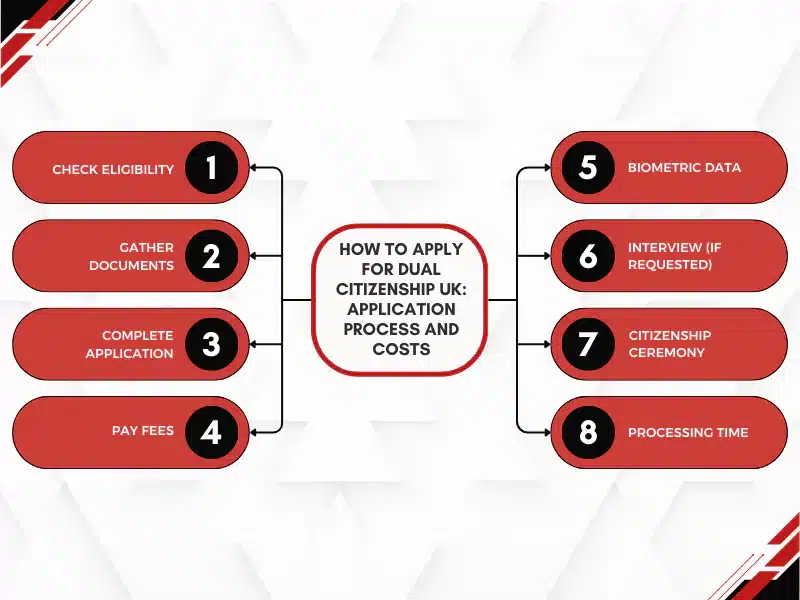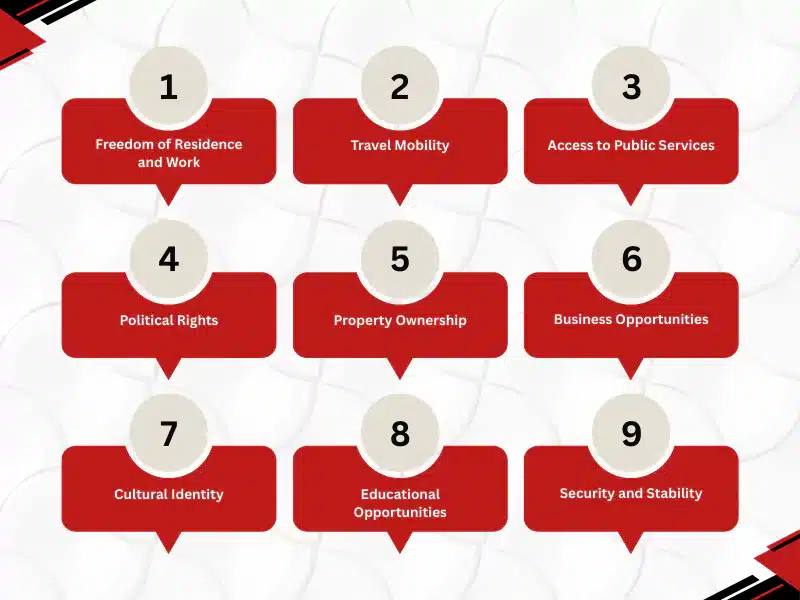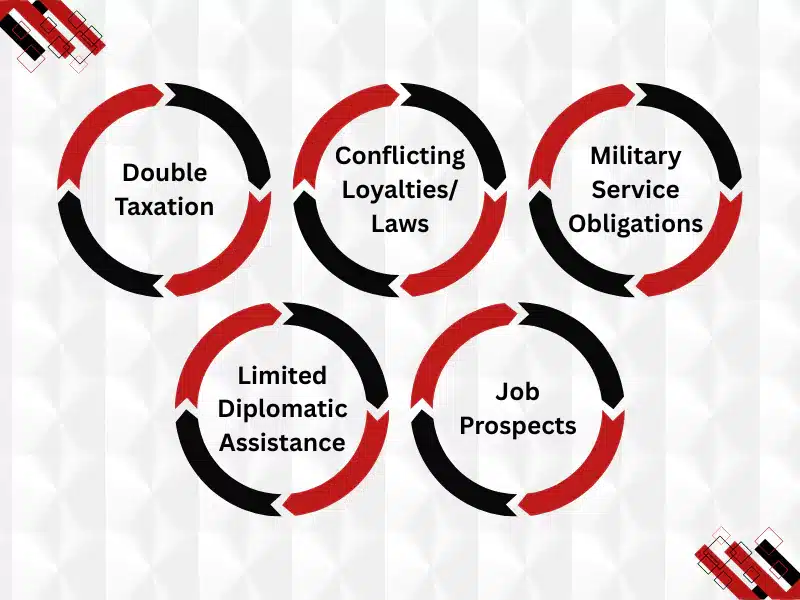While you may be aware of the advantages, such as the opportunity to vote in the UK, this comprehensive blog will also discuss the disadvantages in detail.
Dual citizenship, also known as dual nationality UK or multiple nationality, refers to an individual’s legal status as a citizen of two or more countries simultaneously. The United Kingdom generally permits dual citizenship, allowing individuals to hold British citizenship and that of other countries simultaneously.
This means that individuals are typically not required to renounce their Current Citizenship when becoming a British citizen, nor do British nationals need to give up their British nationality when acquiring foreign citizenship. However, for UK dual citizenship to be fully recognised, both the UK and the individual’s other country (or countries) of nationality must permit it.
Does Britain Allow Dual Citizenship?
Yes, the UK allow dual citizenship. So, you can be a British citizen and a citizen of another country.
What Is the New Rule about British Citizenship?
While there isn’t one single “new rule” that fundamentally changes the concept of multiple citizenship itself, recent legislative changes, particularly the Nationality and Borders Act 2022, have introduced significant updates regarding the deprivation of British citizenship.
This Act has broadened the grounds under which the Home Secretary can revoke British citizenship, especially for dual nationals, by making it easier to do so without prior notification in certain circumstances. Previously, British citizenship could generally only be deprived if it would not render an individual stateless.
However, the 2022 Act has modified this, making dual nationals particularly vulnerable because their loss of UK nationality would not render them stateless. Deprivation can occur if it is deemed “conducive to the public good” or if citizenship was acquired by deception.
How Long Can a UK citizen Stay Out of the UK as a British Citizen?
Once you are a British citizen, there are generally no restrictions on how long you can stay out of the UK. UK nationals have an automatic right to enter and reside in the UK.
However, if you are applying for British dual citizenship, there are strict residency requirements regarding absences from the UK that you must meet before your application. Specifically, applicants must generally not have spent more than 90 days outside the UK in the previous 12 months, and not more than 450 days in the last 5 years (or lived in the UK for at least 270 days in the previous three years if married to a British citizen).
Eligibility Requirements to Obtain British Citizenship (Leading to Dual Citizenship)

When apply to naturalise or apply for citizenship as a British citizen and become a dual national (if the other country permits it), applicants must generally meet specific criteria:
- Age: You must be 18 years or older.
- Mental Capacity: Be of full mental capacity.
- Residency: Have lived in the UK for a qualifying period, usually a minimum of five years. This typically includes holding Indefinite Leave to Remain (ILR), Permanent Residence, or EU Settled Status for at least 12 months (unless married to a British citizen or settled person).
- Absences from the UK: Have not spent more than 90 days outside the UK in the previous 12 months, and not more than 450 days in the last 5 years.
- “Life in the UK” Test: Successfully pass the test, which assesses knowledge of British history, customs, and institutions. This test consists of 24 MCQ questions, requires a 75% pass rate, and costs £50 per attempt.
- English Language: Unless exempted, individuals must meet the English language requirement, typically at a B1 level. To prove, one needs to show an approved English language examination passout certificate or hold a degree taught in English.
- Good Character: Satisfy the “good character” requirement, meaning a clean criminal record and no breaches of UK immigration rules during the qualifying period.
- Intention: Intend to have their main home in the UK.
How to Apply for Dual Citizenship UK: Application Process and Costs

The process for applying for British citizenship (which can lead to dual citizenship) involves several steps:
- Check Eligibility: Confirm that all criteria (as listed above) are met.
- Gather Documents: Collect all necessary supporting documentation, including proof of identity, residency, employment status, and test certificates.
- Complete Application: Fill out the relevant citizenship application form accurately and thoroughly. Applications are typically submitted online through the Home Office website.
- Pay Fees: Pay the required application fees. As of April 2025, the British citizenship application fee is £1,630 (which includes the citizenship ceremony fee), plus a biometric enrolment fee of £19.20. Other potential costs include the “Life in the UK” test (£50) and an English language test (which can cost upwards of £150), and potentially certified translation service fees.
- Biometric Data: Submit your biometric data (fingerprints and photograph) at a designated appointment.
- Interview (if requested): Attend an interview if the Home Office deems it necessary.
- Citizenship Ceremony: If approved, attend a citizenship ceremony to formalise the change of status and receive a certificate of British citizenship.
- Processing Time: British citizenship applications can take up to six months to process, or potentially longer if further information or an interview is required. Also, ensure you hire reputed Language Translation Services so you do not end up losing time because of inaccurate translations.
Which Countries Allow Dual Citizenship with the UK?
Regarding dual passports and citizenship, you can be a citizen of the UK without losing your original citizenship or nationality, if you are from a country that has signed some kind of treaty with the UK. So, you need to apply for it, and you can become an individual with dual nationality.
What Countries Can I Have Dual Citizenship with in the UK?
Many countries have agreements or laws that allow their citizens to hold dual nationality with the UK. These include:
| Australia | Belgium | Canada |
| Denmark | Luxembourg | Portugal |
| Finland | Mexico | South Africa (requires an application to retain citizenship before acquiring foreign citizenship) |
| France | Netherlands (sometimes, if acquired by birth rather than naturalisation) | South Africa (requires an application to retain citizenship before acquiring foreign citizenship) | Greece | New Zealand | Spain | Israel | Pakistan (has a specific agreement) | Switzerland | Italy | Philippines | United States |
What Countries Do Not Allow Dual Citizenship with the UK?
Some countries do not permit British dual nationality and may require individuals who are willing to acquire multiple nationality, to renounce their original citizenship if they acquire British citizenship. These can include:
| China | Japan | Thailand |
| India | Malaysia | United Arab Emirates |
| Indonesia | Singapore | (UAE) |
Is Dual Citizenship Worth It in the UK: Advantages of Dual Citizenship

Holding dual nationality in the UK offers numerous benefits, enhancing an individual’s rights and opportunities across both countries:
Freedom of Residence and Work:
The most significant advantage is the right to reside, work, and study in the UK and other countries indefinitely without immigration restrictions or the need for UK visas.
Travel Mobility:
Dual citizens can hold two passports, which simplifies international travel and offers visa-free or visa-on-arrival entry to a broader range of countries. This is particularly advantageous for individuals with family or business interests in both nations.
Access to Public Services:
A British dual national has full access to public funds, including healthcare services (such as the NHS in the UK) and social benefits are available in both countries to eligible individuals.
Political Rights:
The right to vote in all UK elections and potentially run for public office in both nations.
Property Ownership:
Fewer restrictions on purchasing and owning property in both countries; you just need document translation services to translate foreign language documents (e.g., Polish Language into English.)
Business Opportunities:
To access business opportunities and markets in both countries, facilitating international expansion, you can become a dual citizen.
Cultural Identity:
Maintaining a strong connection to one’s heritage and culture while enjoying the benefits of another citizenship status.
Educational Opportunities:
Potential for lower tuition fees or preferential treatment for higher education in both countries for citizens.
Security and Stability:
Provides a safety net in the event of political instability or economic crises in a particular country.
What Are the Disadvantages of Dual Citizenship in the UK?

Despite the many benefits, dual nationality also comes with potential downsides and complexities. Let’s learn about the disadvantages of dual citizenship UK:
Double Taxation:
Dual citizens may be subject to tax obligations in both countries, depending on the respective tax laws of each country. For example, U.S. citizens living abroad are still generally required to file taxes with the IRS, regardless of their place of residence. This can become complex, particularly if there are no tax treaties to prevent double taxation for double citizenship.
Conflicting Loyalties/Laws:
Dual citizens must adhere to the laws of both their countries of citizenship. This can lead to conflicts of interest or difficult choices, particularly during times of international tension or war.
Military Service Obligations:
Some countries require their citizens, regardless of residence, to serve in the military. A dual national may be legally obligated to serve or face penalties, even if they primarily reside in the UK.
Limited Diplomatic Assistance:
The UK government generally cannot provide diplomatic assistance or protection to a dual national when they are physically in the other country of their citizenship.
Job Prospects:
In some countries, holding United Kingdom dual citizenship may limit eligibility for certain public sector roles, such as those in government or the military.
Loss of Original Citizenship:
If the other country does not permit dual nationality, acquiring British citizenship may result in the automatic loss or non-recognition of the original citizenship. It is crucial to verify the specific laws of the other country before applying.
Specific Considerations
US UK Dual Nationality:
- The American dual citizenship UK permits individuals to hold dual citizenship. This offers benefits like free movement, work, and citizenship by investment between two powerful nations.
- US citizens with dual nationality are still subject to worldwide income taxation by the US, regardless of their residence.
EU Citizens When Apply for UK Citizenship:
- For EU citizens, obtaining Settled Status under the EU Settlement Scheme provides indefinite leave to remain but does not confer British citizenship. To become a British citizen, an EU citizen with Settled Status must still apply for naturalisation and meet all the standard dual citizenship UK EU requirements.
- It is generally not necessary to relinquish a dual nationality passport when applying for British citizenship, provided that the applicant’s country of origin permits dual nationality United Kingdom and the EU.
Children to Get Dual Citizenship:
- Children born overseas to British national parents are typically granted British citizenship by descent. However, this is often limited to one generation if born outside the United Kingdom.
- If both parents are dual citizens of the same two countries, the child usually inherits citizenship from both. If one parent is a dual citizen, the child may still be eligible for citizenship in both countries, depending on the laws of those countries.
Deprivation of Citizenship:
- As mentioned, the Home Secretary has the power to revoke British citizenship if it is deemed “conducive to the public good” or if citizenship was acquired through deception. Dual nationals are particularly vulnerable to deprivation of British citizenship because their loss of UK nationality would not render them stateless, which is typically prevented by international treaties.
- The Nationality and Borders Act 2022 has broadened the grounds for deprivation, making it easier for the Home Office to issue orders, sometimes without prior notification to the individual. Decisions can be challenged through an appeal to the First-tier Tribunal or the Special Immigration Appeals Commission (SIAC).
Seeking Certified Translations for Smooth Operations? Reach Out to Us
The translation must be a “certified translation services UK,” meaning it needs to meet specific standards to be accepted. This usually involves:
- Being produced by a professional translator or translation service.
- Including a confirmation that it’s an accurate translation of the original document.
- Stating the date of the translation.
- Including the full name and contact details of the translator or an official of the translation company.
- Often, it needs to be stamped and signed by the translator/company.
- What Documents Might Need Translation?
- Birth certificates
- Marriage certificates
- Divorce decrees
- Driving Licence translation
- Academic qualifications (if used to prove English language proficiency)
- Police clearance certificates from other countries
- Bank statements or financial documents from foreign banks
- Any other official document that proves your eligibility criteria.
- Why are certified translations for citizenship applications Important?
- Clarity and Verification: The Home Office caseworkers need to understand the content of your documents to assess your eligibility against the legal requirements.
- Prevent Delays: Submitting documents for citizenship without proper translations is a common reason for applications to be delayed or even rejected, as the Home Office will likely request them, adding significant time to your application for British citizenship processing.
We have over 400 certified translators who can accurately translate your documents, ensuring a smooth application for dual citizenship. Call us at +447365600193 or contact us anytime as we are available 24/7!
To Sum It Up,
Dual citizenship with the UK offers significant advantages, including enhanced freedom of movement, wider access to services, and broader opportunities in politics and the economy. However, it also entails essential obligations, such as potential double taxation and adherence to the laws of both countries. Understanding the UK’s permissive stance, alongside the specific laws of one’s other country of nationality, is paramount. With careful consideration and appropriate legal guidance to become a British Dual Citizen, individuals can successfully explore the path to becoming a dual British citizen and enjoy the comprehensive benefits of British citizenship.
Think about it, if you were to give up your original citizenship, would you apply to become a British citizen to stay in the UK?
Frequently Asked Questions
Can British Hold Dual Citizenship?
How to Get a Dual Passport in the UK?
Does the UK Allow Three Citizenships?
How to Avoid Double Taxation in the UK?
How Do I Check If I Have Dual Citizenship?
Am I Eligible for Dual Citizenship in the UK?
Who Qualifies for Dual Citizenship in the UK?
What Is the 10 Year Rule for British Citizenship?
Are You Automatically a Dual Citizen in the UK?
Do I Need to Declare Dual Citizenship in the UK?
Do Dual Citizens Pay Taxes in Both Countries in the UK?
Previous post Get A Detailed Knowledge About Emotive Language
- Translation for Citizenship Applications: British Visa Rules and Requirements - 20th November 2025
- Expert Guide: Dual Citizenship UK Explained - 13th September 2025
- Academic Transcript: How to Get It From Your University? - 17th March 2023

